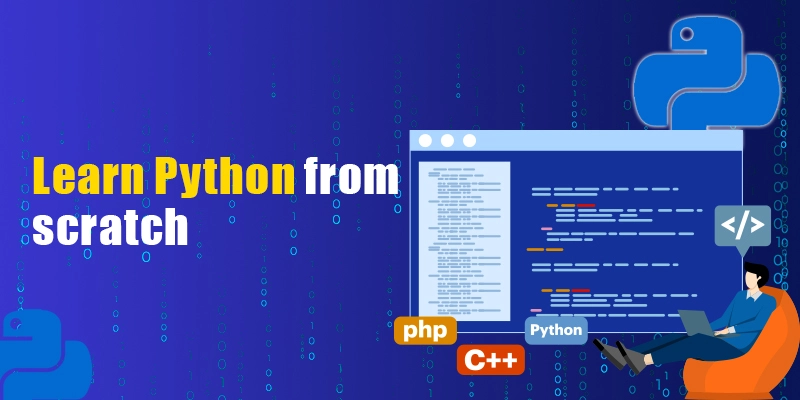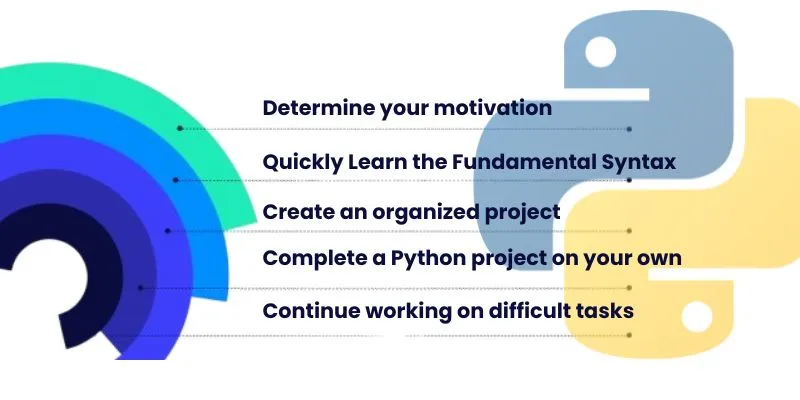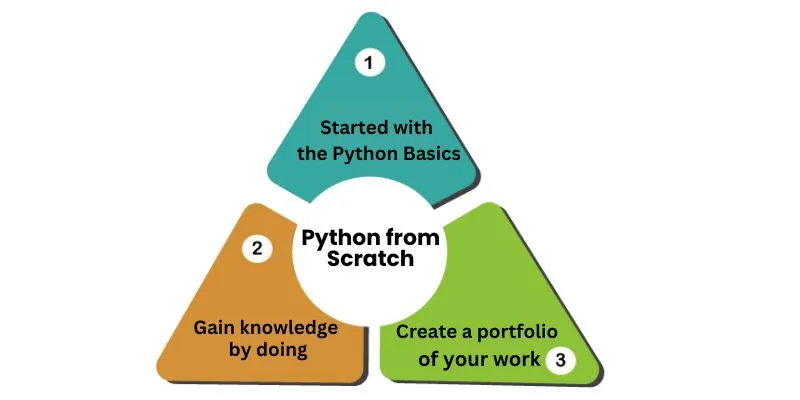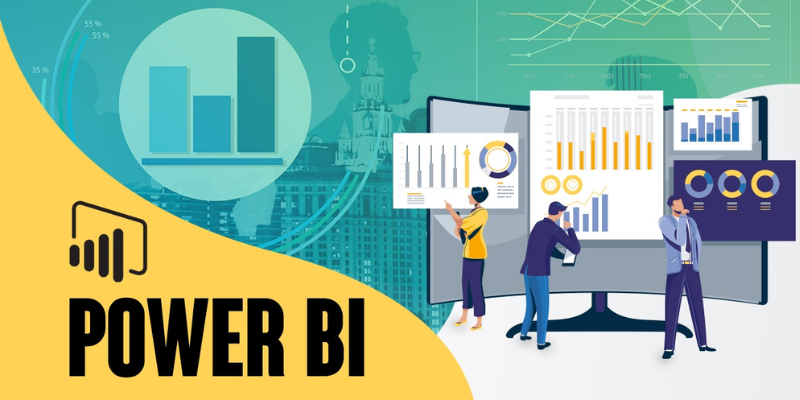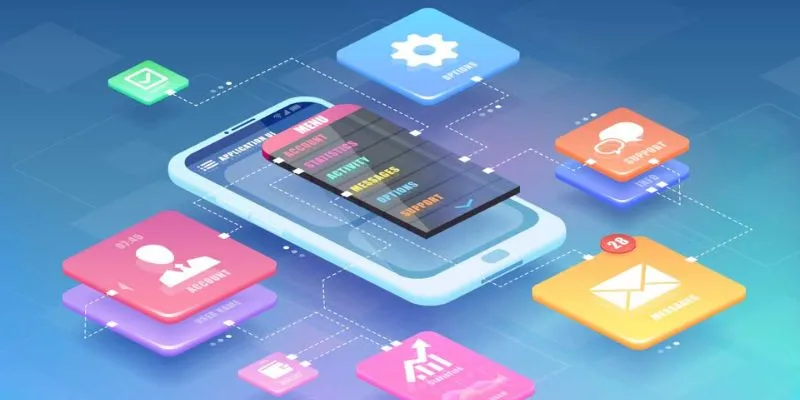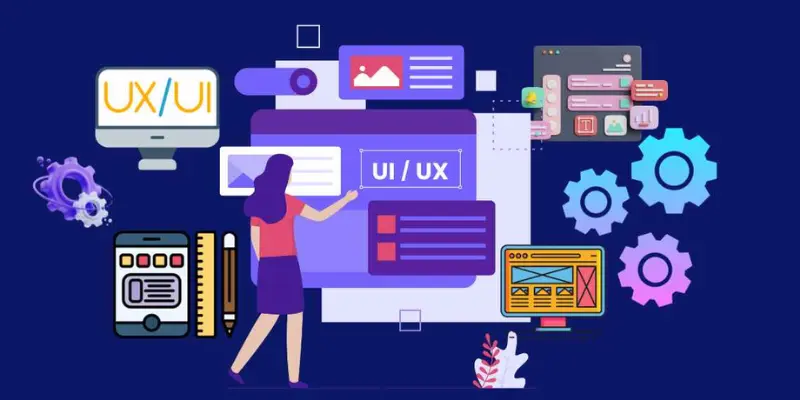Python is among the easier languages for programming used in online applications, software development, machine learning (ML), and data analysis. Developers utilize Python due to its effectiveness, ease of learning, and platform independence. Programmers can express ideas in fewer lines of code using its syntax compared to languages like Java or C++ because it was created with code readability as a top priority. For that, many people are interested in learning Python, but they are unsure of how to learn Python and where to begin. This blog covers all the information you require to start your learning process, including Python courses and helpful tools to make your trip successful.
Guide for Learning Python
1. Determine your motivation
Anyone can learn Python programming and become quite good at it if they are motivated enough. When you first start learning syntax, it is difficult to stay awake. But you gladly stay up all night to complete the project when you have to use the principles of Python to create an engaging one.
Choose one or two topics that you are interested in to get started.
- Data science or machine learning
- Data processing and analysis
- Automating work tasks
- Hardware/sensors/robots
- Websites
- Mobile app
- Computer science
- Games
2. Quickly Learn the Fundamental Syntax
To effectively learn the Python language, you need to grasp the basic syntax and principles. Start by:
- Overview of Python programming
- The Hard Way to Learn Python
- The tutorial for Python
3. Create an organized project
After mastering the fundamentals of Python syntax, begin working on projects. You’ll retain all of your knowledge if you put it to use right away. It’s best to start with controlled tasks and work your way up to more independent creation.
4. Complete a Python project on your own
How to Find Interesting Python Projects?
- Expand and enhance the functionality of the projects you were previously working on.
- View our collection of beginner-friendly Python projects.
- Attend local meetups for Python to meet individuals working on interesting projects.
- Look for open-source software programs to add to.
- Check to see if any NGOs in the area are in need of volunteer developers.
- Look for projects that others have created and try to expand or modify them.
- Look through the blog entries of others to discover intriguing project concepts.
- Consider the gadgets that would simplify your daily tasks.
5. Continue working on difficult tasks
As you gain success with solo endeavors, continue to push the boundaries and scale of your work. Gaining momentum will be necessary to complete the process of learning Python. It is time to tackle something more challenging after you’re totally at ease with what you’re creating. Keep looking for new tests that will test your abilities and propel you forward.
You can easily become an expert in Python by following these instructions. You’ll be more successful if you know how to learn Python language and use it in real-world applications.
If you are interested in beginning your career in the IT industry, you can join the Programming Languages Institutes in Chennai, which provides software-based courses for learners under professional mentors with placement assistance and support.
Learn Python from Scratch
1. Started with the Python Basics
Understanding the basics of Python
Python promotes readability of code and lets you convey ideas in fewer lines of code. The first thing you should do is become familiar with fundamental ideas like operators, data types, and variables.
Installing Python
You must install Python and set up your development environment before you can begin writing code in it. You may get Python from the official website using Anaconda Python, or opened directly in your web browser.
2. Gain knowledge by doing
- Accept challenging projects
- Participate in webinars and code-along
- Utilize what you’ve discovered in your concepts and projects.
3. Create a portfolio of your work.
As you finish off the projects, gather them into a portfolio. Your ability and interests should be represented in this portfolio, which should also be customized to the industry or career you’re interested in. Make an effort to add creativity to your efforts and demonstrate your aptitude for addressing problems.
How to learn Python?
If you’re totally new to Python, there are many ways that you can learn Python, and it will depend on how you like to learn and how flexible your learning schedule is. Here are some of the best ways you can start learning from an affordable Python course with a certificate.
By starting with the Python basics, you’ll build a strong foundation that supports more advanced topics and applications. To make the most of your Python learning experience, select the course that most closely matches your interests and learning objectives.
- Crash Course on Python
- Python for Data Science, AI and Development
- Python Data Structures
- Introduction to Python Programming
- Data Analysis with Python
Career Prospects
1. Data Scientist
The detectives of the digital world, data scientists, find and analyze rich data sources, handle massive volumes of data, and combine data points to spot patterns.
Key skills
- Ability to develop in Python
- knowledge of front-end technologies (HTML, CSS, JavaScript)
- Understanding of Python’s web frameworks (e.g., Django, Flask)
- knowledge of ORM libraries
- Fundamental knowledge of database technology (e.g., MySQL, PostgreSQL)
Join the Data Science Course in Bangalore and gain insights into what it takes to be a Data Scientist, understand the Data Scientist job description, and master the essential skills required to excel in this dynamic and competitive field.
2. Data Analysis
The task of evaluating data and transforming it into knowledge that can suggest improvements for a company falls to data analysts.
Key skills
- Competency with R, SQL, and Python
- Understanding of statistical analysis
- Knowledge of business analysis software (such as Tableau, Power BI)
- Knowledge of data gathering and data cleaning methods
- Good presentation and communication abilities
3. Machine Learning Engineer
Develops programs and methods for machine learning as well as devices and systems capable of learning and applying knowledge.
Key skills
- Proficiency in Python, R and SQL
- Comprehensive knowledge of machine learning
- Understanding of deep learning (such as TensorFlow)
Features of Python
What makes Python such a flexible and popular programming language? Let’s take a closer look at some of its features:
- Fluency in reading: Python is well-known for having a syntax that is easy to understand and somewhat similar to English.
- Simple to understand: Python is so readable, learning the language and comprehending what the code does is not too difficult for newcomers.
- Flexibility: Python has the tools to help you achieve your goals, whether they include web development, task automation, or data science exploration.
- Strong library assistant: You can save time and effort by using the extensive standard library that contains pre-written code for a variety of activities.
- Open source:It is freely distributable and modifiable because it is an open-source language.
- Interpreted language: Python is an interpreted language; each line of code is carried out individually.
- An advanced language: Compared to other languages, Python is more similar to human language. As a result, its core features, such as memory management and architecture, are unimportant to programmers.
Why Python so Beneficial?
Taking a Python course is advantageous for many reasons. Python has applications in a wide range of areas, including tech, finance, healthcare, and more, in addition to its widespread popularity. Python Training in Chennai ensures better professional outcomes and provides a plethora of career alternatives.
Demands for Python Skills
Due to the rapid advancements in data science, machine learning, and artificial intelligence, proficiency in Python is highly sought after. On GitHub, Python is the third most popular language with usage rising 22.5 percent per year. Gaining knowledge of Python can greatly improve your employability and lead to a variety of job perspectives.
Python Developer Job and Salary
| Capgemini | INR 6.2 LPA |
| Cognizant | INR 5.8 LPA |
| Accenture | INR 5.4 LPA |
| Tech Mahindra | INR 5 LPA |
| HCL | INR 5 LPA |
| IBM | INR 4.9 LPA |
| Infosys | INR 4.8 LPA |
| TCS | INR 4.7 LPA |
| Wipro | INR 4.7 LPA |
How long it takes to learn Python?
Depending on your level of programming expertise, the difficulty of the topics you’re trying to understand, and the amount of time you have available to study, learning Python can take a variety of lengths of time. On the other hand, you can typically understand the fundamentals in a few weeks and reach a moderate level of proficiency in a few months with a disciplined learning strategy and constant effort.
The Data Science Course in Chennai are set at an affordable price, making it accessible for everyone interested in learning programming. With reasonably priced, top-notch instruction available, learners can gain valuable programming skills without breaking the bank. This guide has given you a road map for beginning your Python learning journey from grasping the fundamentals to becoming proficient in more complex ideas and working on practical projects.

